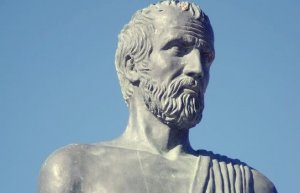Some of the Best Quotes by Philosopher Zeno of Citium

Some of the quotes by Zeno of Citium are related to the basic premises of his school of thought: that there’s a natural, rational order of things and that goodness results from adapting to that order.
Zeno of Citium is the father of Stoicism, although some of his successors, such as Seneca or Marcus Aurelius, are better known. He taught under a famous portico decorated with beautiful paintings. Stoic comes from the Greek stōïkos, meaning “of the stoa [portico, or porch].”
The Stoics defended a life based on reason, prudence, and moderate pleasure. In addition, many of his reflections focused on ethics. This is precisely what you can see in Zeno of Citium’s quotes: the interest in instilling a way of life attached to such values. Here are some of his best quotes.
“A bad feeling is a commotion of the mind repugnant to reason and against nature.”
-Zeno of Citium-
Zeno of Citium on Strength
Many of Zeno of Citium’s quotes exalt the act of thinking. They consider it to be the center and source of everything. One of his quotes clearly shows this: “Thinking must be stronger than matter, and volition more powerful than physical or moral suffering.”
As you can see, for the Stoics, thinking and volition are the most important human traits.

The Most Painful Loss
This is one of Zeno of Citium’s most famous quotes: “No loss should be more regrettable to us than losing our time, for it’s irretrievable.”
The essence of the above quote is about the irreversibility of wasting time. Time passes by and there’s no turning back the clock. All moments are unrepeatable. Wasted moments will never return again.
Raising a Child in a Negative World
Even though the Stoics began to philosophize in the 3rd century BC, many of their reflections are still valid today. This quote is a great example of this: “When you put faith, hope, and love together, you can raise positive kids in a negative world.”
During their time, the tools we currently use in psychology and pedagogy were unknown. However, given that many of them are rooted in common sense, Zeno of Citium shared the above quote, which is still completely valid.

We Should Listen More
Here’s another famous Zeno de Citium quote: “We have two ears and one mouth so that we can listen twice as much as we speak.”
It states that we should be careful with our words. The philosopher stated that listening is more important than speaking. It invites us to pay attention to others and to respond intelligently after careful analysis and understanding of what was said.
True Fortune
Zeno of Citium once sent all of his belongings on a ship that shipwrecked shortly after sailing. When he heard about the wreck, he simply said: “Fortune wants me to have more freedom to philosophize.”
This quote is a masterful example of Stoic philosophy. That school of thought believed in always accepting and understanding reality. In that regard, everything that happens is the result of rationality and we must understand and learn from it.
Some say that Zeno of Citium taught for more than 30 years. However, he killed himself when he was 72 years old. Suicide was very common among the philosophers of his time. (It was a matter of honor, dignity, and quality of life).
Zeno’s beliefs continued to influence philosophers several centuries after.
All cited sources were thoroughly reviewed by our team to ensure their quality, reliability, currency, and validity. The bibliography of this article was considered reliable and of academic or scientific accuracy.
Cappelletti, A. J. (Ed.). (1996). Los estoicos antiguos. Gredos.
This text is provided for informational purposes only and does not replace consultation with a professional. If in doubt, consult your specialist.








